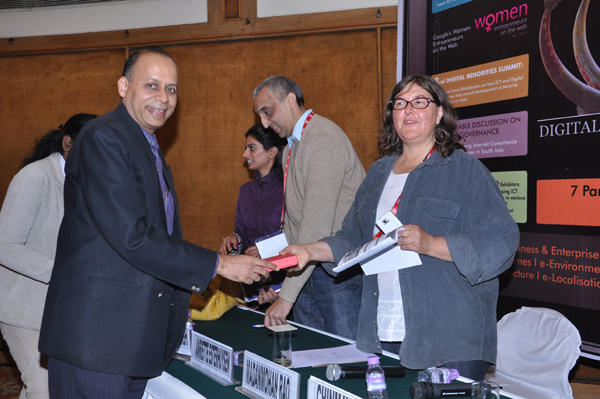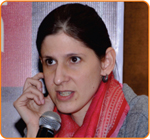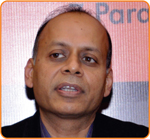Round Table Discussion on Internet Governance
Focus: ‘Emerging Internet Governance: Issues & Challenges in South Asia’

On the occasion of Manthan Award 2012, Digital Empowerment Foundation (DEF) organized the Round Table Discussion on Internet Governance, focusing on ‘Emerging Internet Governance; Issues & Challenges in South Asia’ along with Association for Progressive Communications (APC). This round-table was an effort to understand the scope of internet governance issues in the context of South Asian countries. The session was aimed to meet with the following objectives:
- In the light of recent incidents on internet and reactions from governments and administrations, where do we stand?
- Do we need collective wisdom to work towards Internet Freedom at South Asia level?
- Do we need South Asia Consortium of relevant stakeholders to work together?
Chairperson: Ajay Kumar, Joint Secretary, Department of IT, Govt. of India
Co-Chair & Moderator: Anriette Esterhuysen, Executive Director, Association for Progressive Communications (APC)
Lead Discussants
- Rajnesh Singh, Regional Director, Asia-Pacific Regional Bureau, ISOC
- Subho Ray, President, IAMAI
- Madanmohan Rao, Research Director, Mobile Monday
- Mishi Choudhary, Director of International Practice, Software Freedom Law Center
- Parminder Jeet Singh, Executive Director, IT For Change
- Anja Kovacs, The Internet Democracy Project
- Chinmayi Arun, Asst. Prof at National Law University in Delhi & Fellow at the Centre for Internet & Society
 Ms. Anriette Esterhuysen, Executive Director – Association for Progressive Communications (APC) initiated the round-table discussion by identifying emerging internet related issues and challenges in South Asian countries, specifically in terms of infrastructure and accessibility, free flow of information, content filtration, physical attacks against bloggers and many more.
Ms. Anriette Esterhuysen, Executive Director – Association for Progressive Communications (APC) initiated the round-table discussion by identifying emerging internet related issues and challenges in South Asian countries, specifically in terms of infrastructure and accessibility, free flow of information, content filtration, physical attacks against bloggers and many more. Ms. Anja Kovacs from The Internet Democracy Project, being a first panelist, initiated the discussion on how internet can analyze restructure governance in not only authoritarian but also democratic countries. She recommended freedom of expression is one of the indispensable rights in the democracies. This is so because without freedom of expression, protection of other human rights is very difficult. Another point she added that inherent discrepancies in freedom of speech are hate speeches on one-hand and security issues on the other hand. However, citizens usually oversee such issues in order to keep the freedom of speech intact.
Ms. Anja Kovacs from The Internet Democracy Project, being a first panelist, initiated the discussion on how internet can analyze restructure governance in not only authoritarian but also democratic countries. She recommended freedom of expression is one of the indispensable rights in the democracies. This is so because without freedom of expression, protection of other human rights is very difficult. Another point she added that inherent discrepancies in freedom of speech are hate speeches on one-hand and security issues on the other hand. However, citizens usually oversee such issues in order to keep the freedom of speech intact. While, second panelist, Parminderjeet Singh, Executive Director – IT For Change concentrated his views on the impact of internet governance on the underdeveloped sections of the society. Sharing his views, he pointed that South Asian countries have failed to articulate the concept of internet governance as per their needs; they have either agreed to model specified for the developed countries or have been against them. He added that usually when we talk about e-governance we are limited to the issues of limited infrastructure and connecting the villages to the Internet. These issues are certainly of importance from the national point of view but are somehow not related to governance. To give example of one key issue, as per him which is holding back India is network neutrality. Since most of the content in India comes from western countries, the govt. aims at minting money by making these companies pay for spreading their content. This however is very evasive move for the local content developers who would soon be crowded out by the intentional completion. Many more such issues need to be answered in the Indian internet governance context.
While, second panelist, Parminderjeet Singh, Executive Director – IT For Change concentrated his views on the impact of internet governance on the underdeveloped sections of the society. Sharing his views, he pointed that South Asian countries have failed to articulate the concept of internet governance as per their needs; they have either agreed to model specified for the developed countries or have been against them. He added that usually when we talk about e-governance we are limited to the issues of limited infrastructure and connecting the villages to the Internet. These issues are certainly of importance from the national point of view but are somehow not related to governance. To give example of one key issue, as per him which is holding back India is network neutrality. Since most of the content in India comes from western countries, the govt. aims at minting money by making these companies pay for spreading their content. This however is very evasive move for the local content developers who would soon be crowded out by the intentional completion. Many more such issues need to be answered in the Indian internet governance context.Responding to the views of Mr. Parminder,  Dr. Madan Rao, Reseach-Director added that most Indians today access internet via mobile phones and thus, formulating correct policies in terms of network neutrality is required. Even if we leave internet, even SMS is an important medium to connect and everyone is aware of the disastrous policies that have been adopted in past regarding SMS. A lot of legitimate marketing companies are suffering because they have to pay huge costs to send these SMSs. Similar policies have been imposed for blocking internet to stop the vertical access to the social media sites. Everybody knows the recent case of two girls who had to face legal actions for posting a simple status on Facebook.
Dr. Madan Rao, Reseach-Director added that most Indians today access internet via mobile phones and thus, formulating correct policies in terms of network neutrality is required. Even if we leave internet, even SMS is an important medium to connect and everyone is aware of the disastrous policies that have been adopted in past regarding SMS. A lot of legitimate marketing companies are suffering because they have to pay huge costs to send these SMSs. Similar policies have been imposed for blocking internet to stop the vertical access to the social media sites. Everybody knows the recent case of two girls who had to face legal actions for posting a simple status on Facebook.
 Dr. Madan Rao, Reseach-Director added that most Indians today access internet via mobile phones and thus, formulating correct policies in terms of network neutrality is required. Even if we leave internet, even SMS is an important medium to connect and everyone is aware of the disastrous policies that have been adopted in past regarding SMS. A lot of legitimate marketing companies are suffering because they have to pay huge costs to send these SMSs. Similar policies have been imposed for blocking internet to stop the vertical access to the social media sites. Everybody knows the recent case of two girls who had to face legal actions for posting a simple status on Facebook.
Dr. Madan Rao, Reseach-Director added that most Indians today access internet via mobile phones and thus, formulating correct policies in terms of network neutrality is required. Even if we leave internet, even SMS is an important medium to connect and everyone is aware of the disastrous policies that have been adopted in past regarding SMS. A lot of legitimate marketing companies are suffering because they have to pay huge costs to send these SMSs. Similar policies have been imposed for blocking internet to stop the vertical access to the social media sites. Everybody knows the recent case of two girls who had to face legal actions for posting a simple status on Facebook. This next panelist to share his views was Mr. Rajnesh Singh, Regional Director, Asia-Pacific Regional Bureau, from the Internet Society. According to him, the gravest concern in this context is how governments interact with internet. He specifically meant that what actions or reactions government take when they perceive that things are going wrong. Many decisions are taken on the name of religion, some on the name protecting children and so on. In short there is an excuse for virtually any Govt. policy that is formulated goes wrong. He added that the underlying question here is how will this stop and how can one decide what is good or what is bad. By giving the example of recent upsurges in international politics, he said that when you shut down internet nobody wins. Blocking a particular website or an SMS gateway can never be a solution for a problem. Thus keeping in mind the great diversity in terms of religion, culture and ethnicity we have in the Asia Pacific region, the prime concern should be how governments react to problems and how do they seek to overcome them.
This next panelist to share his views was Mr. Rajnesh Singh, Regional Director, Asia-Pacific Regional Bureau, from the Internet Society. According to him, the gravest concern in this context is how governments interact with internet. He specifically meant that what actions or reactions government take when they perceive that things are going wrong. Many decisions are taken on the name of religion, some on the name protecting children and so on. In short there is an excuse for virtually any Govt. policy that is formulated goes wrong. He added that the underlying question here is how will this stop and how can one decide what is good or what is bad. By giving the example of recent upsurges in international politics, he said that when you shut down internet nobody wins. Blocking a particular website or an SMS gateway can never be a solution for a problem. Thus keeping in mind the great diversity in terms of religion, culture and ethnicity we have in the Asia Pacific region, the prime concern should be how governments react to problems and how do they seek to overcome them. Next panelist to share her concerns was Ms. Chinmayi Arun, Asst. Prof at National Law University in Delhi & Fellow at the Centre for Internet & Society. She shared a tweet from one of her colleagues, which said that why is everyone making a fuss of the article 66A which is just a censorship provision of the IT Act and not paying attention to the ways in which right to privacy is attacked on the web. Though she doesn’t believe in the analysis of relative importance of rights, but still felt that her friend had a point. Right to freedom of speech has been assailed quite seriously in the recent past.The fact that this right is posing huge threats to our right to privacy is very true. Recently enough the govt. has been trying to address the issue by setting up the panels for cyber security and demanding content and clarifications from a number of companies. Also provisions are now being made to ensure that some part of internet infrastructure should be made Indian manufacturers. In short, though cyber security is very important but removing the freedom to speech for the sake of that is not at all an intelligent move. Yet another viewpoint from her was that the emergence of internet governance as concept alone has transformed the ways in which we see democracies. Now we expect them to be more open and deal on more one on one basis with our issues. In fact government across the south Asia today have now started-meaning stakeholders and is making more collective decisions, at least in some areas.
Next panelist to share her concerns was Ms. Chinmayi Arun, Asst. Prof at National Law University in Delhi & Fellow at the Centre for Internet & Society. She shared a tweet from one of her colleagues, which said that why is everyone making a fuss of the article 66A which is just a censorship provision of the IT Act and not paying attention to the ways in which right to privacy is attacked on the web. Though she doesn’t believe in the analysis of relative importance of rights, but still felt that her friend had a point. Right to freedom of speech has been assailed quite seriously in the recent past.The fact that this right is posing huge threats to our right to privacy is very true. Recently enough the govt. has been trying to address the issue by setting up the panels for cyber security and demanding content and clarifications from a number of companies. Also provisions are now being made to ensure that some part of internet infrastructure should be made Indian manufacturers. In short, though cyber security is very important but removing the freedom to speech for the sake of that is not at all an intelligent move. Yet another viewpoint from her was that the emergence of internet governance as concept alone has transformed the ways in which we see democracies. Now we expect them to be more open and deal on more one on one basis with our issues. In fact government across the south Asia today have now started-meaning stakeholders and is making more collective decisions, at least in some areas. The moderator then asked Ms. Mishi Choudhary, Director of International Practice – Software Freedom Law Center as to whether there is a tradeoff between cyber security and freedom of expression and what would be her idea of a secure internet. Ms. Choudhary said that ‘use of Internet is universal and the urge to control it is as universal’. She shared that she believes that word ‘stakeholders’ is a rather fancy word. It is more about citizens who are using the service via different mediums and thus have a stake in it. Again the knee jerk responses we see by the governments across the globe occur because their citizens have tasted freedom in the recent past only be it via Internet or any other medium. She added that as governments are moving together, they are thinking more and more ways of surveillance of their citizens. This is slowly becoming a debate between the netizens and newcomers to this space i.e. governments. Different countries have their own ways of handling issues so it cannot be simply said that there is a tradeoff between cyber security and privacy and the rights of expression. Being from the software background, she is very well aware of the act known as hacking. But this concept has much more political meaning which is that ‘if you try to govern us in a space which has given us new freedom, then we are going to find a way around’. In simple words there is a whole pool of issues that need to be catered.
The moderator then asked Ms. Mishi Choudhary, Director of International Practice – Software Freedom Law Center as to whether there is a tradeoff between cyber security and freedom of expression and what would be her idea of a secure internet. Ms. Choudhary said that ‘use of Internet is universal and the urge to control it is as universal’. She shared that she believes that word ‘stakeholders’ is a rather fancy word. It is more about citizens who are using the service via different mediums and thus have a stake in it. Again the knee jerk responses we see by the governments across the globe occur because their citizens have tasted freedom in the recent past only be it via Internet or any other medium. She added that as governments are moving together, they are thinking more and more ways of surveillance of their citizens. This is slowly becoming a debate between the netizens and newcomers to this space i.e. governments. Different countries have their own ways of handling issues so it cannot be simply said that there is a tradeoff between cyber security and privacy and the rights of expression. Being from the software background, she is very well aware of the act known as hacking. But this concept has much more political meaning which is that ‘if you try to govern us in a space which has given us new freedom, then we are going to find a way around’. In simple words there is a whole pool of issues that need to be catered. This was followed by Mr. Ajay Kumar’s address. He shared that the issues discussed so far are grappling everybody’s mind; we have a very powerful technology that can do things that other means of technology could not do in the past. We are still in the process of learning as to how this technology can be used to serve the best purpose in human lives. The matter of fact is there might be variety of opinions; we are still unable to answer these questions currently. He added that we need to sit down and analyze that what positive things we have achieved thi this technology, answer to which is not very clear. Even after 25 years of invention of internet, we still have huge accessibility problems. We need to address these problems. While we address these issues, some new issues might come up. These are the issues of borderless societies and many more related issues. He further added that he firmly believes that slowly a consensus would build as to how we can address these issues as the society and move toward the goal of getting the most of this technology.
This was followed by Mr. Ajay Kumar’s address. He shared that the issues discussed so far are grappling everybody’s mind; we have a very powerful technology that can do things that other means of technology could not do in the past. We are still in the process of learning as to how this technology can be used to serve the best purpose in human lives. The matter of fact is there might be variety of opinions; we are still unable to answer these questions currently. He added that we need to sit down and analyze that what positive things we have achieved thi this technology, answer to which is not very clear. Even after 25 years of invention of internet, we still have huge accessibility problems. We need to address these problems. While we address these issues, some new issues might come up. These are the issues of borderless societies and many more related issues. He further added that he firmly believes that slowly a consensus would build as to how we can address these issues as the society and move toward the goal of getting the most of this technology.